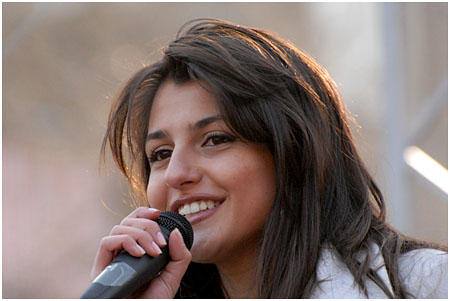
With the first of the semi-finals in this year's Eurovision Song Contest [1] in Belgrade, Serbia, just days away, the countries of the South Caucasus are becoming increasingly excited about the international song contest [2] and how their representatives will fair. What makes the situation all the more interesting is that this year will be the first time all three republics compete.
While this will be the third consecutive appearance of Armenia in the competition, Georgia entered for the first time last year, and Azerbaijan will be making its debut. However, of the three contestants, it is Armenia that currently appears to be the favorite not only from the region, but in general as well.
The British bookmaker William Hill currently has 21-year-old Sirusho at 6/1 [3] to win and the popularity of her song, Qele Qele, has extended way past the borders of the country as the Eurovision Blog confirms [4].
Another tune almost certainly destined for the final is the Armenian entry, Qele Qele. As one of the countries whose national final we paid attention to, we’d heard this one before it was chosen but having heard the other options, we were screaming “Armenia! Choose! This! NOW!!!!!!!!!” before a note of the contest had even been sung. Coming over as Shakira crossed with a healthy dose of Helena Paparizou, only an entirely tone-deaf performance from Sirusho can possibly stop this one from bringing the house down on the night.

All Kinds of Everything for Eurovision 2008 agrees [5].
ARMENIA : This just gets better and better with every run through. Sirusho sounds confident and looks a lot more confident that before. The choreography is complex and involves a lot more rolling on the floor than I would like, but it is effective for the overhead shots. They have almost all the camera angles right, which is more than can be said for several entries, and even if the song is a tad repetitive, the dancing and fireworks add a bit of variety.
Other people may be less impressed but for me this is an absolutely certain qualifier, and it’s not totally out of the running to win.
Posh & Becks of Eurovision is a little more certain that Qele Qele stands a good chance of winning [6] and even says that it is likely to find success outside of the competition itself.
One of the top candidates for victory come the final. Combine the diaspora vote with a modern pop hit with oriental influences and a talented young songtress and the points will be flying in. It’s also worth to know that I’ve already heard “Qele qele” in Stockholm several weeks ago. Could be the hit of the year!
Nevertheless, as Eurovision Song Contest 2008 explains [7], some concerns exist about the ability of Sirusho to perform the song live. So far the singer has only mimed, including during the national final in Yerevan. Regardless of her performance, however, the blog concludes that even if she doesn't win, she's unlikely to finish lower than eighth.
Why are we convinced of the qualification chances of a song we have never heard performed live? Why has everyone put so much faith in statistics and chosen to overlook the fact that for all we know Sirusho might make a total dog's breakfast of the whole thing, even if she does look pretty while doing so? […]
Mind you, there's nothing about Sirusho that suggests she can't handle herself on stage. She clearly knows how to perform, and choreography shouldn't be a problem. It's just that when you mime your way through a national final it does tend to set a few alarm bells ringing. It doesn't help matters that her voice – in the studio version, obviously – has an edge to it that makes me think she's only ever one overambitious dance step away from sounding unattractive for the two and half minutes after that arresting opening.
But while most blogs concentrate on her chances of winning, there has been some controversy surrounding Sirusho's entry. To begin with, the young star had wanted to end her stage show with an exploding microphone, but Eurovision Express reports that competition organizers considered "blowing up a mike on stage is too dangerous [8]."
Meanwhile, in post-presidential election Armenia, the radical opposition have effectively named Sirusho persona non grata [9] and urged a boycott [10] because of the singer's reported link to the former president's family as well as her active involvement in the pre-election campaign of his successor [11], Serge Sargsyan.
Interestingly, even some pro-opposition bloggers such as Unzipped, who also covered the singer's recent promotional tour [12] in London, opposed the move [13].
Remember that in Eurovision Sirusho does not represent Armenian government or merely Public TV (anyone who reads this blog knows my critical opinion towards them). However, above anything else, Sirusho represents Armenia. I can’t boycott Armenian chess players just because chess federation is lead by Serj Sargsyan. I can’t boycott Armenian footballers just because of persona of FA president.
But if Armenia's Sirusho has captured the imagination of many Eurovision bloggers out there, Azerbaijan comes in second from the three South Caucasus republics with the somewhat flamboyant and seemingly eccentric Elnur & Samir. Eurovision Song Contest 2008 describes the song [14] and considers that it also stands a chance of making it into the final if only because it is “over the top.”
If there's one thing Day After Day cannot be accused of, it is subtlety. […] the Azeris have looked at the contest and decided that what it needs, and what it takes, is three minutes of pure theatre. Had anyone asked me prior to this year's songs being chosen which country I thought would produce the campest entry of 2008, Azerbaijan would never have figured in my top 40, let alone my top 5. And yet look at what they are giving us: an OTT tale of elicit passion, with pop-rock sensibilities, a splash of ethnicity and a falsetto faux-opera prologue, played out by the archangel and the Devil himself. If ever there was a recipe for success in the Eurovision Song Contest in the 21st century, I'd say the Azeris have found it. However unintelligible it may be.
And that's whether we like it or not. Day After Day bears all the hallmarks of a song that will do well regardless of its musical quality; it is so impudent it simply must be rewarded. Which is not to say it suffers a lack of quality. The music, while unspectacularly well produced, knows which buttons to push and when to push them. As you might expect, the strings carry much of the melodrama, while the electric and bass guitars are put to good use in producing the underlying atmosphere. The general sense is of a composer very much aware of what he's there to do: produce a workmanlike backdrop of sound against which the histrionics can unfold.
[…]
I am very confident that we will be seeing Azerbaijan in the final, and wouldn't be at all surprised to see them coming top of the class in 2008.
Posh & Becks of Eurovision isn't so convinced and describes it as "horrendous screaming and…well…weird and crazy [15]." All Kinds of Everything for Eurovision 2008 agrees [16].
Azerbaijan has given a new dimension to the phrase “over the top”. One of the few lines that you can make out in this awfully pronounced English is “save us from all this” and never has a line been so appropriate. Again the backdrop is the only think that’s working in the performance, as the camera work is awful and there’s so much going on on stage that you can’t distinguish anything from a mixture of pyrotechnics and quasi operatic screaming. Sadly this is likely to qualify because of the Turkish and Azeri diaspora, but it certainly needs a lot of work by the delegation to make it look good on screen.
Still, one thing in Azerbaijan's favor from a blogging point of view is the constantly updated LifeBlog of Elnur & Samir [17]. It might not be written by the duo themselves, but it does feature photos, videos and accounts from on the ground in Serbia. If prizes should be awarded for showmanship, it is these singers that would most likely win. Eurovision Song Contest News reports on how their debut in the competition has been received [18] at home.
Elnur and Samir were asked about the interest of their nation for the Contest, since it's the country's first participation in Eurovision. They replied that enthusiasm grows steadily in their country. As for themselves, they admitted that it took them two days to realise what had happened after they won in their national selection. The two contestants concluded the press conference inviting everyone to a live concert with them and other artists from their country on stage and they presented the press pack, which included a fine selection of gifts and gadgets from the Land of Fire.
Which brings us on to Georgia and an entry by blind singer, Diana Gurtskaya [19]. Unlike Armenia and Azerbaijan, the song — Peace Will Come — hasn't attracted as much attention even if it is somewhat poignant as tensions increase between the country and Russia [20] over Abkhazia. The choice of song performed by a Georgian refugee from the breakaway region was not lost on some Eurovision pundits [21] such as Eurovision Song Contest News.
Diana Gurtskaya started her press conference by singing her song for the 2008 Eurovision Song Contest, Peace Will Come, a cappella, and she did the same with the Hebrew song Jerusalem Of Gold, which she had previously recorded as well. When Diana was asked if she believed in the message of her song, she responded that, in fact, she was convinced that peace will come sooner or later. Talking about that, she also referred to her home region in Georgia, which is still in state of war today.
Eurovision Song Contest 2008 says the song is naïve and its message will be lost [22] on an audience interested only in "three hours of brainless entertainment."
Of course, that depends whether you consider sending a blind woman to perform an anthem in which she is basically saying “if I can see this why can't you” to be naïve, and many would say that it is actually about as studied as you can get. The mere fact that the song is a peace anthem though is what makes it naïve: as well-meant as these things possibly are, they frequently come across as disingenuous, especially in a contest where people don't necessarily want a song with a message. Eurovision may be designed to bring people together, but no one wants the credo shoved down their throats, and in that sense what you are saying is bound to fall on deaf ears. That may even be in spite of the fact that the message is pertinent to the situation in the country it is representing, as with Peace Will Come and the instability plaguing Georgia. In this day and age people are cynical enough without Eurovision force-feeding them moral virtue. Wrong audience.
Well, with the first semi-final scheduled for 20 May and the final four days later, there isn't long to wait now to see how this year's Eurovision Song Contest plays out. Meanwhile, you can check out the entries from Armenia, Azerbaijan and Georgia in the videos below. Enjoy.
Sirusho, Armenia
Elnur & Samir, Azerbaijan
Diana Gurtskaya, Georgia